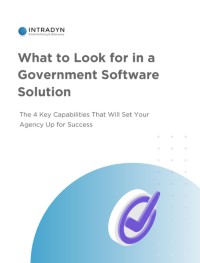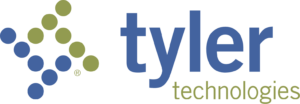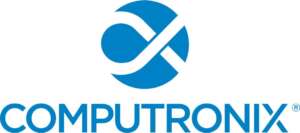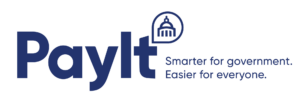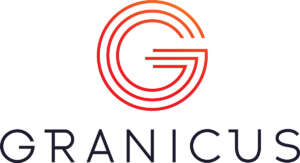Top 10 Local, Municipal & State Government Software Solutions [Checklist Included!]
![Top 10 Local, Municipal & State Government Software Solutions [Checklist Included!]](https://www.intradyn.com/wp-content/uploads/2022/04/government-software-solution-checklist-1.jpg)
Like any modern organization, government agencies at all levels rely on software systems and tools to store data, manage operations and complete key tasks. However, unlike organizations in the private sector, government agencies are meant to serve the public, which means they’re subject to certain requirements that can make it challenging to find optimal solutions.
In this article, we’ll not only discuss some of the top-rated local, municipal and state government software solutions on the market today, but also what government agencies need to look for in both a solution and a provider.
What Are Local, Municipal & State Government Software Solutions?
“Local, municipal and state government software” is really a catch-all term used to describe any system or solution used in the day-to-day operations of a government agency at all levels.
Some common examples of software for local, municipal and state government include:
- Enterprise Resource Planning (ERP) Systems: Don’t be fooled by the word “enterprise” — ERP systems play just as important of a role in the public sector as they do in the private sector. ERP software is designed to help agencies aggregate data across multiple departments and gain visibility into everything from how government resources are allocated to how different teams manage administrative processes. Armed with this information, government leaders can engage in more strategic decision-making, develop standardized core processes that enhance efficiency and support public policy, and then manage those processes on a day-to-day basis.
- Performance Management Tools: This is a fairly broad category that encompasses any software government institutions use to track their progress against established goals — for example, a 10% reduction in crime rates or a 7% increase in high school graduation rates. Many performance management tools leverage reporting and analytics to provide agencies with an accurate, data-driven picture of where they stand relative to their target outcomes and business intelligence to deliver insights on what measures they can take to achieve those outcomes.
- Government Accounting Software: From processing payroll, to managing loans and grants, to ensuring that government funding is appropriately allocated, government institutions are responsible for a wide variety of financial processes and procedures. Accounting software makes it easier for agencies to stay on top of financial reporting by generating financial statements and balance sheets for each department; serving as a general ledger for accounts payable and payroll management; recording grants, programs and funding sources; and more
- Archival Software: Though government agencies are typically the ones responsible for enforcing different laws and regulations, they’re also subject to them. From the Freedom of Information Act and other public record laws to the Federal Rules of Civil Procedure, many of these regulations come with strict data retention requirements. Archiving solutions provide institutions at the local, municipal and state level with the tools they need to securely store and manage public records, as well as rapidly search through thousands of files and reproduce documents upon request. This not only enables agencies to comply with applicable regulations, it also supports transparency, which is incredibly important in the public sector.
- Work Order Systems: Given the vast number of buildings and public spaces government agencies are responsible for managing, they need an easy way to monitor and manage licensing, permitting and repairs. Work order systems do exactly that, providing a portal through which government employees can submit work order requests and track their status in real time; automate components of the permitting and licensing processes for greater efficiency; and gain visibility across all government assets.
- Citizen Relationship Management Software (CRM): CRM software enables government agencies to track interactions with customers — or, in this case, citizens — collect their data and store it in a secure, centralized location. This provides agencies with a holistic view of each citizen, which helps to develop a better understanding of the public’s needs, make more informed decisions, form stronger relationships and better serve the community. Certain “citizen relationship management” platforms can even be configured to offer self-service capabilities, which empower citizens to fill out forms, provide public comment, submit applications and more, all from their chosen device.
These are just a few examples of the many kinds of local, municipal and state government software and how they’re used.
What is Local, Municipal & State Government Software?
“Local, municipal and state government software” is really a catch-all term used to describe any system or solution used in the day-to-day operations of a government agency at the local, municipal or state level.
Some common examples of software for local, municipal and state government include:
- Enterprise Resource Planning (ERP) Systems: Don’t be fooled by the word “enterprise” — ERP systems play just as important in the public sector as they do in the private sector. ERP software is designed to help agencies aggregate data across multiple departments and gain visibility into everything from how government resources are allocated to how different teams manage administrative processes.Armed with this information, government leaders can engage in more strategic decision-making, develop standardized core processes that enhance efficiency and support public policy, and then manage those processes on a day-to-day basis.
- Performance Management Tools: This is a fairly broad category that encompasses any software government institutions use to track their progress against established goals — for example, a 10% reduction in crime rates or a 7% increase in high school graduation rates.Many performance management tools leverage reporting and analytics to provide agencies with an accurate, data-driven picture of where they stand relative to their target outcomes and business intelligence to deliver insights on what measures they can take to achieve those outcomes.
- Accounting Software: From processing payroll, to managing loans and grants, to ensuring that government funding is appropriately allocated, government institutions are responsible for a wide variety of financial processes and procedures.Accounting software makes it easier for agencies to stay on top of financial reporting by generating financial statements and balance sheets for each department; serving as a general ledger for accounts payable and payroll management; recording grants, programs and funding sources; and more.
- Archival Software: Though government agencies are typically the ones responsible for enforcing different laws and regulations, they’re also subject to them, too. From the Freedom of Information Act and other public record laws to the Federal Rules of Civil Procedure, many of these regulations come with strict data retention requirements.Archiving solutions provide institutions at the local, municipal and state level with the tools they need to securely store and manage public records, as well as rapidly search through thousands of files and reproduce documents upon request. This not only enables agencies to comply with applicable regulations, it also supports transparency, which is incredibly important in the public sector.
- Work Order Systems: Given the vast number of buildings and public spaces government agencies are responsible for managing, they need an easy way to monitor and manage licensing, permitting and repairs. Work order systems do exactly that, providing a portal through which government employees can submit work order requests and track their status in real time; automate components of the permitting and licensing processes for greater efficiency; and gain visibility across all government assets.
- Customer Relationship Management (CRM) Systems: CRM software enables government agencies to track interactions with customers — or, in this case, citizens — collect their data and store it in a secure, centralized location. This provides agencies with a holistic view of each citizen, which helps them develop a better understanding of the public’s needs, make more informed decisions, form stronger relationships and better serve the community.Certain “citizen relationship management” platforms can even be configured to offer self-service capabilities, which empower citizens to fill out forms, provide public comment, submit applications and more, all from the device of their choosing.
These are just a few examples of the many kinds of local, municipal and state government software and how they’re used.
10 Popular Software Solutions for Local, Municipal & State Government
Searching for the ideal software solution for local, municipal or state government? Presented in no particular order, these are some of the leading systems in the field:
| Solution | Category | Highlights |
| Enterprise Permitting & Licensing Software Powered by EnerGov | Permitting, Licensing, Planning Review and Asset Management Platform |
|
| Enterprise ERP Software Powered by Munis | Enterprise Resource Planning Platform |
|
| All-in-One Archiver | Electronic Communication Archiving Platform |
|
| ClearPoint | Government Strategy Reporting Platform |
|
| SeeClickFix | Issue Reporting System |
|
| POSSE Enterprise Platform | Government Workflow Engine |
|
| SmartGov | Community Development Platform |
|
| CityReporter | Inspection, Management & Workflow Tracking Platform |
|
| PayIt | Government Services & Electronic Payments Platform |
|
| Granicus | Citizen Relationship Management Software |
|
In need of an archiving solution for your government institution? The Intradyn team has worked with agencies at all levels of government to implement archiving software and help them maintain compliance — contact us today to learn more.
1. Enterprise Permitting & Licensing Software Powered by EnerGov
This enterprise permitting, licensing, planning review and asset management solution is designed to help government institutions make more informed decisions using data analytics, eliminate departmental and agency silos, maintain open lines of communication with the public and empower workers in the field.
Software type: Enterprise Resource Planning System
Key features include:
- Esri GIS mapping technology for real-time spatial analytics
- Centralized database for easy information sharing
- Specialized apps for citizen use
- Personalized reporting via open data sourcesMobile capabilities to support field work
- Centralized workflows to unify data across the organization
- Customized reporting for more accurate forecasting
- On-demand views and performance filters
Pricing: Available upon request
The reviews are in…
“EnerGov has the best support of any software company I’ve ever worked with in over 20 years in IT. Their development teams make a concerted effort to understand and implement the best user experience and interface for their diverse customer base. You always feel that the EnerGov team CARES about you and your needs.”
— Ryan N., G2
2. Enterprise ERP Software Powered by Munis
An enterprise-scale ERP platform created with government agencies and educational institutions in mind, Enterprise ERP delivers advanced capabilities for financial management, human resources, payroll, procurement and more. Enterprise ERP claims to be “fully customizable to your needs,” with the option to extend core functionality with add-ons for revenue management, tax billing and collection, utility billing and more.
Software type: Enterprise Resource Planning System
Key features include:
- GIS integration for simplified property and asset management
- Mobile applications to enhance workplace productivity
- Business intelligence tools powered by the Hub platform
- Easy-to-use drag-and-drop dashboard
- Socrata integration for financial data management and advanced analytics
Pricing: Available upon request
The reviews are in…
“Munis is used by every department within our office. Munis is great because it has the capability to be used by our mapping department, listing department, vehicle department, GIS department, appraisers and collections department. Munis prevents our office from being required to have multiple software systems because it can handle all of our needs.”
— Kristen Reeves, TrustRadius
3. All-in-One Archiver by Intradyn
Intradyn’s All-in-One Archiver offers real-time capture and secure storage of all electronic communications, including email, instant messages, social media communications and text/SMS messages. In doing so, this solution creates a tamper-proof record of all workplace communications, helping government agencies remain compliant with key regulations, including FOIA, sunshine laws, the Federal Records Act, FRCP and more.
Software type: Archival Software
Key features include:
- Compatible with all major email providers, social media platforms and cellular carriers
- Legal hold automation and redaction tools to support legal compliance
- Powerful search functionality capable of searching millions of files in just seconds
- Ability to set granular and flexible custom retention policies according to applicable regulations
- Archives secured with user role-based permissions, two-factor authentication and 256-bit encryption
Pricing: Available upon request
The reviews are in…
“It works day after day without intervention, locating and exporting emails is fast and easy. End users like the ability to search their emails based on date and specific content without having to manually scroll through long lists. Very seldom have to contact support but when needed their support rocks. Has to be the best I have encountered in my IT years.”
— Kevin S., Capterra
4. ClearPoint Strategy
ClearPoint’s government strategy reporting software is a performance management tool that provides a centralized database for all strategic initiatives, enabling both government officials and members of the public to easily track progress against target outcomes. By quickly aggregating data from across your institution, ClearPoint makes it easy to gain a comprehensive view of what needs to be done and how best to do it, so you can start setting goals and defining benchmarks that much sooner.
Software type: Performance Management Tool
Key features include:
- Ability to build public-facing dashboards to share updates with citizens and promote transparency
- Custom reporting for data-driven decision-making
- Ability to drill down in strategic reports and see each department’s individual contribution
- Automated report distribution to enhance workplace productivity and ensure department alignment
- Integration with budget management systems to align spending with strategic goals
- Easy data sharing and benchmarking for collaboration with performance management peers
Pricing: Available upon request
The reviews are in…
“The software is very intuitive and extremely flexible, as it caters to our needs as the customer. We appreciate the many resources that are available to support us in getting used to the product so that it is not intimidating or overwhelming. We don’t feel limited in any way regarding how we will use the product as we make plans to move from our initial use (strategic management) to other possibilities (i.e., project management). We are also pleased with the layout and format options we have for our reports.”
— Delinda P., Capterra
5. SeeClickFix by CivicPlus
SeeClickFix is an issue reporting system that fosters communications between public works departments and the communities they serve. Using SeeClickFix’s mobile application, citizens can easily submit 311 requests and monitor the status of open tickets and work being completed in real time. On the agency side, SeeClickFix enables government workers to collect, manage and route requests from their desktop or mobile device; handle internal communications related to open requests; and create streamlined workflows to get work done.
Software type: Citizen Relationship Management Software
Key features include:
- Intuitive web forms and mobile applications designed for ease of use
- Multiple citizen access points, including web portal, mobile app,
- Facebook app and call taker interface
- Automatically detects and eliminates duplicate requests for greater efficiency
- Automated issue routing and service request assignment based on location and category
- Workers are able to access details about existing issues, including images, prior to going onsite
- Native integration with over 20 local, municipal and state government software solutions
Pricing: Available upon request
The reviews are in…
“SeeClickFix allows us to interact with the public and instantaneously track our results following that interaction. It’s also useful to demonstrate accountability for each department that responds to a complaint or report.”
— Richard B., Capterra
6. POSSE Enterprise Platform by Computronix
A powerful workflow engine that automates, integrates, monitors and enforces business process rules, the POSSE Enterprise Platform enables agencies to easily aggregate and search all government data. POSSE can be configured to automate almost any government workflow, including materials management, professional licensing, regulatory management, environmental management and more.
Software type: Enterprise Resource Planning System
Key features include:
- Ability to build custom citizen portals with POSSE WebUI platform and user-friendly tools
- GIS mapping technology for responsive, modern mapping experience and custom map generation
- Mobile functionality and support for native applications on iOS and Android for on-the-go use
- Ad hoc reporting module for easy performance management report generation and dashboard-building
Pricing: Available upon request
The reviews are in…
“POSSE (server/client) is very flexible in the way it adapts to business changes and very reliable in the way it performs on a daily basis. From data entry (permitting/inspections) to report generation, the customizable user interface is simple, easy to learn and use.”
— Mark L., Capterra
7. SmartGov by Brightly
SmartGov — Brightly’s mobile-friendly, cloud-based community development platform — automates key components of the permitting, planning, licensing and inspection processes, enabling government agencies to ensure adherence with proper procedure, expedite projects and drive revenue growth. SmartGov even features a citizen portal, so that members of the public can submit and track permit applications, pay online and review real-time inspection results.
Software type: Work Order System
Key features include:
- Your choice of configurable web-based platform or mobile application
- Ability to create streamlined workflows for permit, inspection and business license processes
- Citizen portal for submitting and tracking permit applications in real time
- Consolidated platform for organizing and managing planning application resources
- Ability to print or email code enforcement notifications for compliance purposes
- Mobile app-enabled case action automation
- Custom reporting for permit lifecycle, business license and enforcement case management
- GIS integration for permit, project, inspection, project and enforcement case mapping
Pricing: Available upon request
The reviews are in…
“I’ve used several permitting software applications over the years, and each has their unique advantages and disadvantages. I would say that [Brightly’s] willingness to take customer feedback to improve [SmartGov] is one of the most important things to me. They have an amazing team that is always available and willing to help find a solution.”
— Woody S., Capterra
8. CityReporter by Noratek Solutions
CityReporter is a cloud-based inspection, management and workflow tracking solution that enables local governments to eliminate paper-based processes and streamline inspection management. By replacing manual paperwork with web forms and moving everything onto a digital platform, CityReporter makes it easy for employees in the field to document inspections and enhance public safety.
Software type: Work Order System
Key features include:
- User-friendly interface for monitoring permit status for every building
- Sync with Outlook calendar with inspection schedules and updates
- Mobile enablement for easy onsite documentation and inspection management
- E-filing creates centralized database for all inspection data
Pricing: Available upon request
The reviews are in…
“We use CityReporter only for inspection scheduling and inspection tracking. Noratek welcomes ideas and suggestions. At times, ideas are implemented immediately. Other ideas go into their future development basket and I have found often those ideas get added in future updates. Noratek simply provides the best support of any software that I have ever used. […] I wish I could abandon iCity and focus solely on CityReporter for all things permits.”
— Rod L., Capterra
9. PayIt Enterprise
PayIt is a government services and electronic payments platform that natively integrates into government agencies’ existing systems of record. Using PayIt’s self-service portal, citizens can make payments on everything from property taxes and water bills to business licenses and parking tickets, all from the device of their choosing. By digitizing the payment process, PayIt enables institutions to accelerate time to revenue, optimize otherwise manual processes and increase citizen engagement.
Software type: Citizen Relationship Management Software
Key features include:
- Detailed transaction reporting and dashboards for holistic view of transaction data
- Secure digital wallet stores citizen’s payment details and personal information for fast payment
- Government workflow automation with ability to customize according to business rules
- Scalable platform enables multiple departments and agencies to exist within the same system for greater cross-channel functionality
- Expedited revenue collection and rapid disbursement for more accurate picture of available funds and enhanced essential service allocation
- Chat interface enables citizens to ask questions, with chatbot functionality to deliver always-on service
- PCI Level 1 merchant certification shifts compliance obligations from government agencies to PayIt
Pricing: Available upon request
The reviews are in…
“PayIt has helped our office to bring more digital services to our residents. We wanted to enhance our online presence for a while, but the service we had before them wasn’t cutting it. PayIt took our wishlist and made it a reality. They did it quickly, and they did it professionally. They are hands-on and keep you up to date every step of the process. Working with PayIt we quickly offered an omnichannel payment solution to our users, increasing collections and user satisfaction.”
— Rachel M., G2
10. Granicus
Granicus is a cloud-based platform that enables federal, state and local governments to connect with their citizens. The service offers a no- or low-code way for these agencies to create experiences that integrate municipality websites, services and communications — making it possible to better serve all residents. What’s more, the platform is specifically intended for government use at all levels and can meet the unique security and infrastructure needs that each requires.
Software type: Government-specific Citizen Relationship Management Software
Key Features Include:
- Online agenda management
- Digital minutes recording
- Provides citizens with digital access to live meeting webcasts, meeting agendas, minutes and more
- Customer service hub
- Create no-code forms that provide submission validation data in real time
- Online customer portal
- Advanced records search capabilities
- Secure digital record storage
Pricing: Available upon request
The reviews are in…
“It’s definitely a lot better than anything we’ve tried before. Things go a lot faster. It has improved our transparency, too. With the implementation of Granicus, we now have all of our legislation online and available to the public instantly.”
— Colleen Ingman, Featured Customers
Government Software Solutions from Intradyn
In need of government software solutions for your institution? The Intradyn team has worked with agencies at all levels to implement archiving software and help them maintain compliance — contact us today to learn more.
Or, discover the four criteria to look for and find questions to ask potential government software vendors with our free, downloadable checklist.
